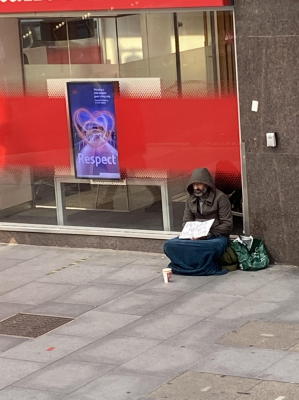Charities protest at government plan to further criminalise homelessness

'Hungry and Homeless' in London
Source: Westminster J&P, Caritas
Homeless campaigners have expressed concern at the government's proposal to replace the archaic Vagrancy Act, with legislation that could punish homeless people even more. Under the 1824 Vagrancy Act, it is a crime to sleep in a doorway or beg. Currently anyone convicted under the law faces a fine of up to £1,000 and a two-year criminal record. People who can't afford to pay fines are often sent to prison.
Although the government pledged to scrap the Act in 2021, since then more than 1,000 homeless people have been arrested for sleeping rough or begging. On 26 March this year, the government unveiled their new 'anti social behaviour plan' - but rather than offer support to homeless people - it consists of a raft of proposals to replace the Vagrancy Act with new powers for local authorities and the police to move, or issue more fines, to homeless people "causing nuisance."
Fr Dominic Robinson, chair of Westminster Diocese Justice and Peace Commission told ICN: "The government's proposals to replace the archaic Vagrancy Act with yet more punitive measures against those forced by abject poverty to sleep rough or in temporary and substandard accommodation is an affront to civilised society.
"This policy will exacerbate the vicious circle the poor find themselves in. The ever increasing destitute currently being helped to regain their dignity through so many charitable services which provide shelter, food and other basic necessities, are now being demonised as criminals and so driven still further onto the forgotten margins of society.
"The dignity of every human person, and especially those desperately trying to survive in an increasingly cruel world, should surely be the starting point for trying to eradicate rough sleeping.
"We all want to solve this problem and make our streets safe too but charities, faith groups and government need to work much more closely together on this. Arrests, fines and moving people on will not help this. Those working in the sector, including the large number of faith groups, know the homeless situation is far more complex than knee-jerk solutions will resolve. Rather this will only contribute to the hostile environment towards anyone on the peripheries of our fake notion of civilised society".
Matt Downie, chief executive of Crisis homeless charity commented: "We must not find ourselves in a situation where we finally abolish one destructive law only for it to be replaced with another."
Instead, he called on the government to build genuinely affordable homes, invest in proper support services and ensure that housing benefit covers people's rents to end homelessness.
In a statement echoing this, Caritas Westminster said: "As we approach the Coronation of King Charles III, we urge the authorities to work closely with homeless services to ensure that those experiencing street homelessness are not simply asked to move on, as part of a 'clean-up', but are instead provided with longer term support to help them to move off the streets, like we experienced during the 'everyone -in' campaign in the pandemic.
"80% of people currently sleeping rough have complex health and social needs due to difficulties in their past, often caused through no fault of their own. Some may have resorted to alcohol and drugs in order to supress the cold, the pain and the worry. Addictions and past traumas cannot be addressed purely by the provision of accommodation. There is an urgent need for mental health and addiction support, and most importantly lots of time and patience. These are complex responses, that require specialist intervention from commissioned homeless services. Church communities can provide food, welcome and befriending support alongside these partners, and advocate for social change.
"At Caritas Westminster, we support parishes to reach out and support those most in need in our communities. We encourage Catholics to look to those who are street homeless without judgement, but with love and kindness; to be present for them and to listen to them. We have previously asked 'Should we give money to beggars', see our response here
We also encourage Catholic parishes and schools to consider the hidden homeless, such as families and young people living in temporary accommodation; in hostels, sofa surfing and in B&Bs. News reports this week have highlighted how many children are living in overcrowded accommodation, not able to sleep properly due to sharing beds with other family members and with no space to do their homework.
Friendships formed through strong Church or School communities can provide a social safety net for people going through tough times, helping to prevent homelessness. Elizabeth Wills, the Caritas Westminster lead for homelessness in the Diocese of Westminster, has been listening to those affected as part of a project with the Cardinal Hume Centre and Justlife in conjunction with local services. She speaks to young families living in crowded accommodation, with inappropriate sleeping arrangements. She has met families with several young and older children sharing mattresses on the floor, without carpets, often in rooms with little ventilation, rising damp and mould that leads to respiratory conditions. Others live in unsafe streets, and with broken doors, windows and appliances that never get fixed, despite frequent complaints. She is helping those affected to advocate for change.
As the country comes together to celebrate the Coronation of our new monarch, so we can come together to demand that those in authority do more to ensure everyone has a decent home."


















